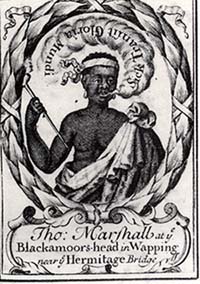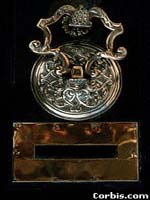|
Sugar
and Other Tropical Products
|
|
| Sugar,
coffee, tea, and other tropical goods first appeared in Great Britain as
a product only available to the wealthy. These goods, however, eventually
became the cheap, commonplace pleasure and necessity of the masses. (28)
These goods became a part of the British lifestyle, even of the most
poor. Tea became a popular commodity in the 18th century, as is indicated
by the records of the East India Trading Company. The East India Company's
records reveal that tea "took off" as a major commodity in England
during the years 1700-1710, and by the 1750s, over 37 million pounds of
tea came to Britain. (29) Prior to the 18th
century, tea was a commodity of the royal court. As the slave trade increased,
however, the product became more available. In the 1680s tea was a courtly
ritual and a source of flattery and persuasion between major traders and
the court. By the 1780s, however, tea was the drink of the common people.
(30) The common people, however, recycled
tea leaves to make them more economical. The prevalence of tea indicated
the growing merchant economy in Great Britain and a growing middle class
wishing to identify with the wealthy. |
|

A tobacco advertisement ( 80) |
|
| Tea
was not the only tropical product to reach the masses of the
people in Great Britain. Coffee became a staple beverage during
the 18th century as well. By 1740 there were over 550 coffee
houses in London alone. (31)
These establishments became common meeting places and hotbeds
of political activity in addition to selling tropical goods.
|
| The
coffee houses provided the bitter beverages and an inviting
environment for the rise in Britain's consumption of sugar.
The slave trade allowed merchants to exchange slaves for this
tropical good direct from the plantations and island sugar refineries.
As a result, the price of sugar fell by half during the 17th
century. (32) Like tea
and coffee, the implementation of the slave trade increased
sugar's availability to the lower classes. By the 1790s, on
average, each Englishman ingested more than 20 pounds of sugar
per year. (33) |
Slavery
allowed these products to become staples of British life, and in exchange
for these goods, they found a market for the slave trade and their
manufactured items. These goods included shoes, candles, felt hats,
pewter, cottons, and even beer.(34)
Even non-manufactured goods, such as beef, butter, sundry oats, cheese,
and potatoes, found markets in the West Indies.(35)
The result was Britain's extensive and almost unshakable economic
intertwinement with the slave trade. |
|
|
To return
to the economics forum, click on the door below.

|